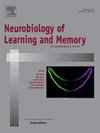雄性自发性高血压大鼠表现出目标导向控制能力下降和更新先前学习的困难
IF 1.8
4区 心理学
Q3 BEHAVIORAL SCIENCES
引用次数: 0
摘要
对重复行为的习惯性控制是适应性的,因为它可以让常规行为在认知能力有限或有负担的情况下继续下去。然而,认知需求对行为控制的影响尚未在动物习惯模型中得到充分研究。这项研究使用了一种已知认知缺陷的大鼠——自发性高血压大鼠(SHRs),研究它们在结果值、工具偶然性和多任务刺激预测变化后更新行为的能力。结果贬值任务用于测试工具性能是否对结果值的变化敏感。虽然SHRs降低了对贬值结果的反应,但相对于Long Evans对照,这种影响受到抑制。随后引入了遗漏偶然性,当曾经得到强化的反应现在阻碍了自由结果的交付时,SHRs无法调整自己的反应。巴甫洛夫贬值任务发现,SHRs对贬值不敏感,并在出现奖励预测刺激时进入杂志,无论刺激预测的结果是贬值还是非贬值。最后,当最初预测食物颗粒的刺激不再加强时,SHRs被发现比Long Evans更慢地抑制初始学习。总的来说,这些任务有助于更好地描述SHRs的行为能力,并扩展我们对有限的认知能力与习惯性行为表达之间的关系的理解。本文章由计算机程序翻译,如有差异,请以英文原文为准。
Male spontaneously hypertensive rats demonstrate reduced goal-directed control and difficulty updating previous learning
Habitual control of repeated behaviours is adaptive because it can allow routine behaviours to continue under conditions where cognitive capacity is limited or burdened. However, the impact that cognitive demand has on behavioural control has not been thoroughly studied in animal models of habits. This study used a strain of rats—spontaneously hypertensive rats (SHRs)—that have known cognitive deficits to investigate their ability to update their behaviour following changes to outcome value, instrumental contingency, and the predictions of stimuli across multiple tasks. An outcome devaluation task was used to test whether instrumental performance was sensitive to changes in outcome value. While SHRs reduced responding for the devalued outcome, this effect was dampened relative to Long Evans controls. An omission contingency was then introduced and SHRs were unable to adapt their responding when a once reinforced response now prevented the delivery of a free outcome. A Pavlovian devaluation task found that SHRs were insensitive to devaluation and entered the magazine upon presentation of a reward-predictive stimulus, regardless of whether the stimulus predicted a devalued or non-devalued outcome. Finally, SHRs were found to be slower than Long Evans to inhibit initial learning when a stimulus that initially predicted food pellets was no longer reinforced. Collectively, these tasks help better characterize the behavioural capabilities of SHRs and extends our understanding of how limited cognitive capacity relates to expression of habitual behaviour.
求助全文
通过发布文献求助,成功后即可免费获取论文全文。
去求助
来源期刊
CiteScore
5.10
自引率
7.40%
发文量
77
审稿时长
12.6 weeks
期刊介绍:
Neurobiology of Learning and Memory publishes articles examining the neurobiological mechanisms underlying learning and memory at all levels of analysis ranging from molecular biology to synaptic and neural plasticity and behavior. We are especially interested in manuscripts that examine the neural circuits and molecular mechanisms underlying learning, memory and plasticity in both experimental animals and human subjects.

 求助内容:
求助内容: 应助结果提醒方式:
应助结果提醒方式:


